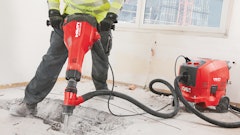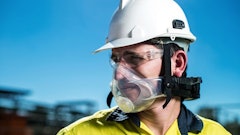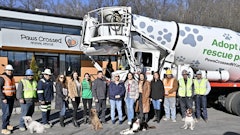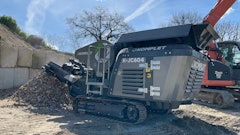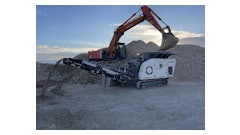
*This content is sponsored by Propane Education & Research Council (PERC)*
Every jobsite needs a generator, and every generator needs power.
Diesel, propane, battery, hybrid – what should you choose? The answer (as always) is: It depends. Here are some questions you need to answer when assessing your options.
1 – Where are you located?
State matters. Gasoline prices fluctuate depending on the season and the region. Plus, diesel costs are subject to varying taxes and supply chain challenges (i.e. weather, infrastructure). On the gulf coast and in the north central U.S., for example, diesel prices tend to be low, making a diesel generator a viable option. But that’s not the case for states like Hawaii, Pennsylvania and California. Propane is the smart choice.
“Why would I choose propane over diesel? It's abundant and affordable. California is the biggest user of propane in the United States. If you start using propane on the jobsite instead of diesel, your operating cost is going to go down,” explains Jim Bunsey, senior manager of safety and compliance for Propane Education & Research Council (PERC).
PERC is exhibiting at Work Truck Week 2024 in Indianapolis March 5-8, and Bunsey will be there explaining many of the power generation advantages of propane.
Usage matters. The more uses you get from your fuel the better. “So, if you're using it to heat your business, heat your home and you're using it to run your equipment and to run your power generators, your usage goes up but your cost goes down,” Bunsey says. Same thing happens with diesel. The more you use, the better rate you get.
“Especially on the landscape side, we know a lot of guys run their landscape business out of a garage or a barn on their own property. The cost of their propane goes down drastically.
“If you're using propane, you can buy two years of fuel, they'll actually lock in the price. So, if you're a fleet of rental equipment, you know what your fueling cost is going to be because you know your consumption, you know how much work you're doing.”
[ RESOURCE: See current state by state propane prices here. ]
2 – How are you using the generator?
Backup vs. primary. Backup generators have practical uses in all locations in the U.S. but are not the best choice if you plan to power multiple buildings, tools or equipment or if you need your generator to run daily, as your generator will have limited runtime and lifespan. A prime power or hybrid generator is an ideal candidate. Hybrid solutions let you harness battery power in conjunction with fuels like propane so you get the best of both worlds.
Another consideration if you’re not using the generator very often is the reliability of the power and stability of the fuel. Diesel will break down over time and cause corrosion, while batteries if not stored properly (controlled for temperature, moisture and in full power) will fail to take a charge over time. Propane may be your best choice. “You look at the stability of propane as a fuel. It’s a closed system under moderate pressure that can last in the tank for decades.”
Indoor vs. outdoor. As many of the concrete contractors in our audience know, indoor power generation needs to protect workers’ health from adverse effects. For indoor jobsites, propane or battery-operated generators do the trick. “We can give the best energy inside enclosed spaces,” Bunsey says of propane.
Propane is also a great option outdoors in the worst conditions. It works in negative-degree cold that makes starting a diesel generator hard, 100+ degree heat that exacerbates diesel fumes, and doesn’t require any additional maintenance unlike batteries. A final consideration around outdoor use is the unfortunate incidence of diesel fuel being siphoned and stolen from generators, which is not an issue in battery and propane-powered generators.
[ RELATED LINK: The Ultimate Guide to Power Generation ]
3 – How much power do you need?
Do the math. First, when we’re talking power, you always want the right amount for your application, not more and not less. Generators are rated in watts and the range is large – 800W to 500,000+W. What you’ll want to do is look to the manufacturer of the devices or equipment you plan to run on the generator and do some calculations.
Running wattage (R) + Starting wattage (R x 3) = Total wattage needed
(Your equipment likely lists amperage and voltage. A simple equation is watts = amps x volts.)
Energy density. Propane has a lower energy density than diesel at 26 megajoules per liter vs. 35 MJ/L. That means power will be greater with diesel. But if you don’t need to go big, why overpay? “It's just energy density, but if you're paying less for it, the affordability comes in and the maintenance goes away,” Bunsey says.
Speaking of maintenance. While all generator types advertise long lifespans, that’s with proper maintenance. Diesel generators have fewer critical parts and equipment managers tend to be familiar with them. With propane generators, you don’t have to clean a carburetor or fuel system, making them a very simple solution. Both need service about every 200 hours (consult your model’s specifications).
Overall, the reliability and efficiency of your generator is going to depend on your specific needs. By asking these questions you can guarantee your business gets the generator you need.
---
Sidebars:
A Case Study on Resilience (from the guide)
Jayson Waller has grown a thriving business in energy efficiency and solar panel installation in recent years. His Mooresville, North Carolina–based company, Powerhome Solar, offers energy storage systems and standby generators. The initiative reflects a new viability for the combination of solar panels, battery systems, and standby generators. By adding a propane standby generator, your business has more independence, creating an additional form of onsite energy storage.
What About Combined Heat & Power?
Micro-combined heat and power (CHP) units are common in Hawaii and Puerto Rico and spreading in popularity. While traditional CHPs were only used by large commercial businesses like hotels, micro-CHPs powered by propane or natural gas provide less than 50kW making them a power solution for contractors and rental businesses with combined office/shop locations. They also can create ancillary revenue streams. One outside-the-box option: A truck wash. A Connecticut location has used micro-CHP to power the electricity for the wash, to heat the water and put in a snowmelt system. CHP units can create electricity cheaper than buying from the grid and offer independence in service-deprived areas. They’re still not portable yet, but that could be on the horizon.
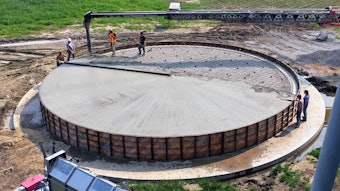



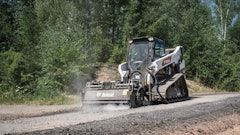
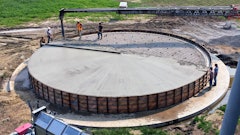
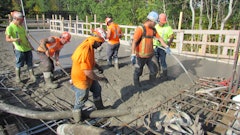


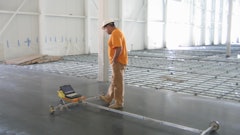



![Glp Porsche 072723 465 64ee42287c29e[1]](https://img.forconstructionpros.com/files/base/acbm/fcp/image/2024/03/GLP_PORSCHE_072723_465.64ee42287c29e_1_.65e88b8589b9c.png?auto=format%2Ccompress&fit=crop&h=135&q=70&rect=0%2C520%2C2250%2C1266&w=240)


